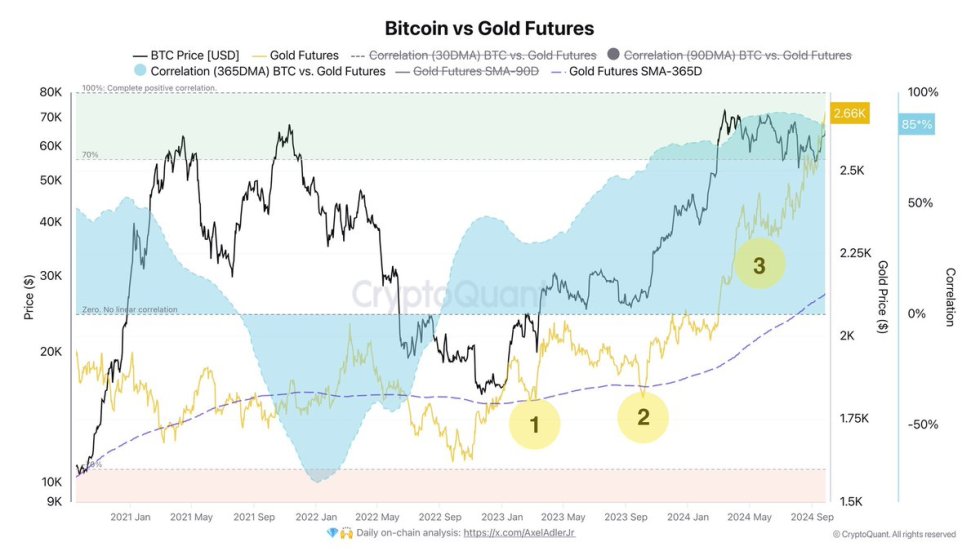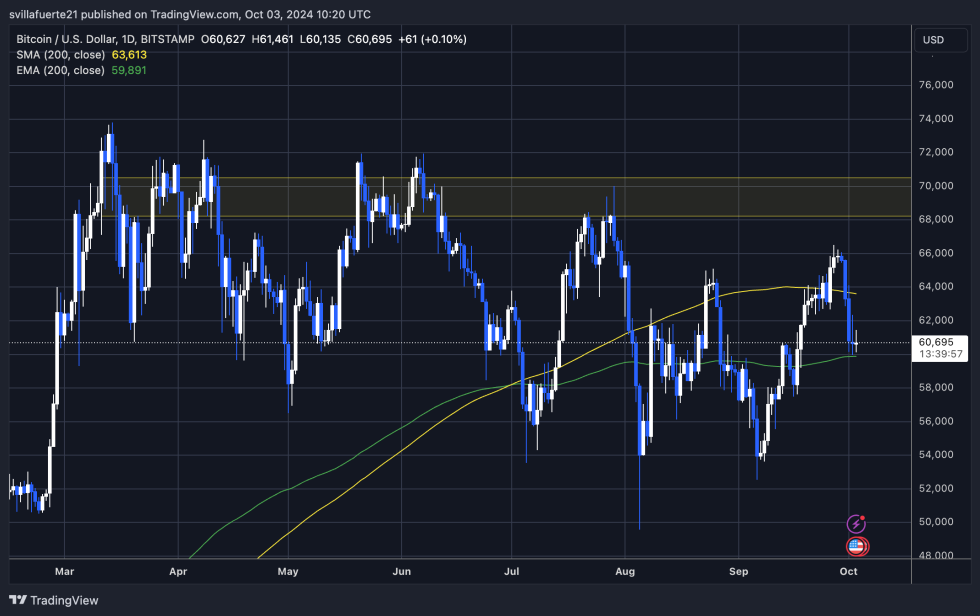Bitcoin and Gold: Exploring the 85% Correlation
In recent months, Bitcoin has shown an increased correlation with Gold, reaching as high as 85%, a striking connection between two seemingly different assets. This shift has drawn attention, especially in a world where both traditional and digital assets vie for investor interest. This article will explore the nuances behind this correlation, what it means for investors, and how Bitcoin and Gold—despite their alignment—remain fundamentally different.
The Rise in Correlation
The relationship between Bitcoin and Gold has evolved considerably, especially during times of economic uncertainty. Traditionally viewed as "digital gold," Bitcoin's correlation with the precious metal was particularly evident during the 2022 U.S. banking crisis, where institutions like Silicon Valley Bank (SVB) collapsed. During this period, both assets demonstrated an increased interdependence, reflecting shared market responses.
According to recent reports, Bitcoin's correlation with Gold has remained consistently high. Analysis shows that on various timelines, such as the 30-day, 90-day, and even the 365-day moving averages, the correlation has been positive, hovering near or above 80%. This strong alignment has reignited discussions around Bitcoin's status as a safe haven, a narrative that had taken a back seat during the crypto bull run of 2021.
What stands out in this analysis is that Bitcoin's correlation with Gold surged following events like the FTX collapse and the broader crypto market turmoil. In such periods, both assets behaved similarly, underscoring the shifting perception of Bitcoin as an asset with more stable, "safe-haven" qualities compared to its volatile past.
Gold: The Traditional Safe Haven
Gold has long been regarded as the quintessential safe haven, a hedge against inflation, and a store of value in times of market turbulence. The precious metal's status is underpinned by centuries of use as a medium of exchange, a reserve asset, and a protector of wealth in both good and bad times.
The underlying reasons for Gold's role as a safe haven remain tied to its tangible nature and limited supply. Unlike fiat currencies that can be printed at will, Gold is mined in finite amounts, making it a hedge against the devaluation of currencies. It thrives during periods of economic uncertainty because investors tend to flock to tangible assets when other investments, such as stocks or bonds, become too risky.
Bitcoin, however, is a more recent entry into the financial landscape, having been launched in 2009. It has been marketed as "digital gold" due to its limited supply (capped at 21 million coins) and the decentralized, immutable nature of its blockchain . Bitcoin's value, much like Gold's, derives from its scarcity, but it differs in that it is a purely digital asset.
What Sets Bitcoin Apart?
While the growing correlation between Bitcoin and Gold is intriguing, it is essential to highlight their distinctions. For one, Bitcoin's decentralized nature makes it an entirely different asset class compared to Gold, which is stored and traded in centralized financial systems. Bitcoin operates on a peer-to-peer network without a central governing authority, which theoretically makes it more immune to government control or monetary policy.
Furthermore, Bitcoin's volatility is still considerably higher than Gold's. Although the correlation between the two assets has strengthened, Bitcoin's price fluctuations continue to exceed those of Gold. For instance, during market upheavals, Gold often sees modest percentage movements, while Bitcoin can experience dramatic swings in value, both upwards and downwards. This higher risk-reward dynamic remains a significant differentiating factor for investors considering the two assets .
Additionally, while Gold has centuries of historical backing as a safe haven, Bitcoin is relatively new. Its role as a stable store of value is still being tested, especially as it transitions from a speculative asset to a recognized financial instrument.
Correlation in Crisis: Banking Collapses and Market Shocks
During the U.S. banking crisis and subsequent global economic instability, Bitcoin and Gold demonstrated a high correlation. This period of uncertainty allowed both assets to serve as alternative investment vehicles for those seeking to hedge against traditional markets. Investors, wary of centralized banking systems, turned to Bitcoin for its decentralized properties and to Gold for its historical stability.
Interestingly, the collapse of Silicon Valley Bank (SVB) in 2022 served as a prime example of Bitcoin and Gold moving in tandem. Both assets experienced a surge in value as the banking sector teetered. According to experts, this movement highlighted growing concerns around "counter-party risk" in traditional banking, a fear that pushed both individual and institutional investors toward more resilient, non-sovereign assets like Bitcoin and Gold.
The Road Ahead: Bitcoin and Gold as Complementary Assets?
While Bitcoin and Gold have demonstrated increasing correlation, they may not necessarily compete for the same role in an investment portfolio. Some investors view the two as complementary.
For instance, during periods of high inflation or geopolitical uncertainty, Gold might serve as a safer, more established hedge. Meanwhile, Bitcoin offers a higher-risk, higher-reward option, particularly for those seeking to capitalize on technological and financial innovation .
Bitcoin's future as a "safe-haven" asset remains to be fully realized. As governments and financial institutions continue to grapple with regulation, Bitcoin's potential for mainstream adoption is likely to impact its correlation with Gold. The introduction of central bank digital currencies (CBDCs), for example, could either reinforce Bitcoin's role as a decentralized alternative or challenge its appeal if these digital currencies can offer similar benefits with less volatility. BTC is trading above the 1D 200 EMA. | Source: BTCUSDT chart on TradingView
BTC is trading above the 1D 200 EMA. | Source: BTCUSDT chart on TradingView
Summary, while Bitcoin's correlation with Gold highlights some intriguing overlaps, the two assets retain their unique roles in the broader financial ecosystem. Investors looking for safety may still prefer Gold, but those with a higher risk tolerance and a belief in the future of digital finance may continue to see Bitcoin as a promising alternative.
This news article highlights the significant developments surrounding the 85% correlation between Bitcoin and Gold, offering insights into what sets them apart despite their growing connection. As these assets continue to evolve in the eyes of investors, understanding their correlation and individual characteristics will be critical in making informed decisions.

















![[ℕ𝕖𝕧𝕖𝕣] 𝕊𝕖𝕝𝕝 𝕐𝕠𝕦𝕣 𝔹𝕚𝕥𝕔𝕠𝕚𝕟 - And Now What.... Pray To The God Of Hopium?](https://cdn.bulbapp.io/frontend/images/79e7827b-c644-4853-b048-a9601a8a8da7/1)










![[LIVE] Engage2Earn: auspol follower rush](https://cdn.bulbapp.io/frontend/images/c1a761de-5ce9-4e9b-b5b3-dc009e60bfa8/1)






